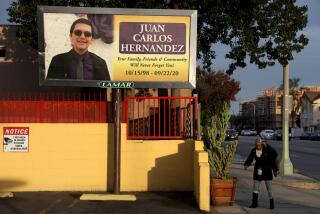Eric Kay’s attorney says others, including Matt Harvey, gave Tyler Skaggs drugs

More than two years after Tyler Skaggs died in a suburban Dallas hotel room, the man charged with supplying the drugs that killed him went on trial Tuesday in a courthouse 15 miles away.
Inside Room 205 in U.S. District Court in Fort Worth, a federal prosecutor, during a 30-minute opening statement, told jurors that evidence and witness statements — some from as many as seven former Angels players — will prove Eric Kay, a former Angels communications director, guilty of supplying the drugs that led to Skaggs, a popular 27-year-old Angels pitcher who died after choking on his own vomit in a suburban Dallas hotel room.
“Eric Kay is the one person who provided counterfeit oxycodone pills to Tyler Skaggs,” Lindsey Beran, an assistant U.S. attorney, contended. “And Tyler Skaggs is dead because of it.”
Kay’s lawyer countered the prosecution’s narrative with a bombshell allegation: By Kay’s account, Matt Harvey, Skaggs’ teammate, could have provided the drugs that led to Skaggs’ death.
In his opening statement, Reagan Wynn, one of Kay’s three attorneys, conceded Kay was an opioid addict who at one point obtained drugs from Hector Vazquez, the umpire room attendant at Angel Stadium who was fired shortly after Skaggs’ death. But he also alleged that Skaggs had supplied Kay with pills for years. Wynn added that Kay sought treatment for his addiction in April 2019 and only relapsed when Skaggs asked him to acquire drugs for the Angels’ trip to Texas.
Answering questions about the Eric Kay trial that opens Tuesday. The ex-Angels employee is accused of providing drugs that killed pitcher Tyler Skaggs.
He said Kay distributed drugs to other players, though he claimed Kay didn’t profit. He also acknowledged Kay initially lied to police about seeing Skaggs in his hotel room the night he died. But he asserted that Kay didn’t provide the drugs that left Skaggs dead.
The defense attorney told the jury that, according to Kay, Harvey gave Skaggs pink pills he saw crushed to powder on the desk in Skaggs’ hotel room the night he died.
“Those are Percocets from Harvey,” Wynn said Kay recollected Skaggs telling him.
The Tarrant County medical examiner’s office determined Percocet wasn’t in Skaggs’ system when he died, according to a toxicology report released in August 2019.
The county’s medical examiner ruled Skaggs died from “mixed ethanol, fentanyl and oxycodone intoxication” that led to him choking on his own vomit. Percocet is a mixture of acetaminophen and oxycodone. Acetaminophen, according to the report, wasn’t found. The government, however, did discover Percocet in Skaggs’ hotel room.
The Angels released Harvey, once an All-Star with the New York Mets, three weeks later. Harvey, 32, is a free agent after spending the 2021 season with the Baltimore Orioles. He is on the list of potential witnesses in the trial, which is scheduled to last two weeks.
At 2:59 p.m. local time Tuesday, after a morning spent plowing through jury selection, Kay stood up and pleaded not guilty to the two counts he faces: supplying Skaggs counterfeit pills laced with fentanyl that resulted in his death and conspiring since at least 2017 to “conspiracy to possess with intent to distribute fentanyl and oxycodone.”
Kay, 47, faces a 20-year minimum sentence if convicted of provided Skaggs the drugs that resulted in his death.
Skaggs was found dead in Room 469 at the Hilton Dallas/Southlake Town Square on the afternoon of July 1, 2019, hours before the Angels were scheduled to begin a series against the Texas Rangers. The shocking death pushed Major League Baseball into the center of the country’s opioid epidemic, launching a wide investigation by the Southlake Police Department and Drug Enforcement Administration that led to Kay.
Kay was charged on July 30, 2020, and turned himself in eight days later. He was indicted by a federal grand jury in October 2020.
On Tuesday afternoon, Beran told the jury that the evidence will show Kay was Skaggs’ “drug dealer” who provided Skaggs fentanyl-laced drugs in Texas, that the fentanyl he provided was the probable cause of death, that he lied to Southlake Police about seeing Skaggs the night he died to cover his tracks, and that Kay provided opioids to other major leaguers.
Andrew Heaney, another major league pitcher who was Skaggs’ Angels teammate, was the first and only witness called to testify Tuesday. Heaney, who signed with the Dodgers in November, testified that Skaggs was his best friend on the team, but he said he didn’t know Skaggs abused opioids.
He pointed Kay out in the room when the prosecution asked him to. He described Kay as a “nice guy” who “did his job” before adding “there were times when he could be unprofessional.” He didn’t elaborate.
Eric Kay, the Angels’ former communications director, has pleaded not guilty to federal charges in Tyler Skaggs’ death.
Kay observed the trial with a straight face. Earlier in the day, during jury selection in a more intimate room two floors above, he seemed more at ease, reacting to Judge Terry R. Means’ occasional joke with a smile or laugh. The tension had quickly built.
A group of reporters and four television cameras awaited Kay when he exited the courtroom at 4:55 p.m. The sun was setting, giving way to a chilly night.
“You guys know I can’t comment,” Kay said when asked for his thoughts on the trial.
He then crossed the street, to return Wednesday morning for another long day beginning with Heaney’s cross-examination.
Times staff writer Nathan Fenno contributed to this report.
More to Read
Go beyond the scoreboard
Get the latest on L.A.'s teams in the daily Sports Report newsletter.
You may occasionally receive promotional content from the Los Angeles Times.









